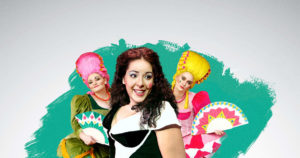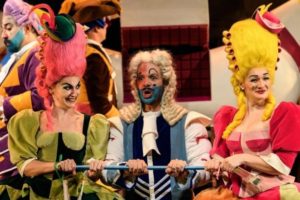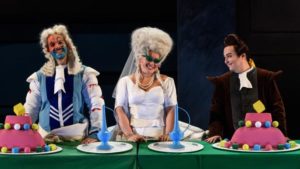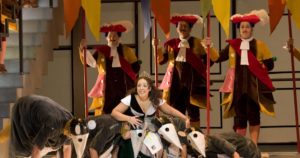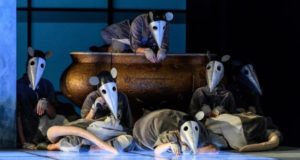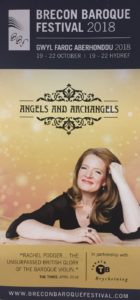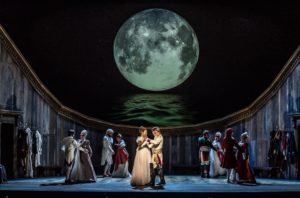We asked our team to choose their personal three cultural events of 2018 along with a favourite performance and/or organisation. Enjoy reading their individual responses below.
Barbara Elin
2018 has been quite a year; when I submit my thesis on New Year’s, it will be the culmination of four years of intense research, and quite the end of an era (and hopefully the start of a new one). So I’m lucky that, in between the furious bouts of writing and the dreaded editing, I’ve been distracted by some truly brilliant productions, too many to narrow down – from the vicious Motherf**ker with the Hat to the inventively-staged Turn of the Screw and the impressive evocation of character in This is Elvis and At Last: The Etta James Story, 2018’s theatre and dance landscape has provided an embarrassment of riches. So I’m going to cheat a little bit in narrowing down to my ‘top 3’…
3) For ingenuity and fun, Mischief Movie Night/ Murder for Two
No two productions have made me laugh this year more than these two – and though they share a common thread of entertaining ingenuity, they’re vastly different from each other. The former showcased the talent of Mischief Theatre’s on-the-spot improvisational skills, the latter was a tightly-wound machine of script, song and silliness. Both of these productions demonstrated how creative and clever the craftsmanship of theatre is – all while making you laugh too!
2) For pure, joyous entertainment, Young Frankenstein / Rock of Ages.
I love a good musical, and these are two of my favourites in recent memory. The original Young Frankenstein movie is in my top 3 movies ever, so I worried a musical version with a whole new cast could never do justice to the original – well, it did with bells on! Brilliant songs, spectacular setpieces and an original evocation of that original cast made this a must-see. And I have such special memories of seeing Rock of Ages for the first time, so it always has a place in my heart – it’s also one of the only truly great jukebox musicals I’ve seen, and this new cast reinvigorated an already raucous, rip-roaring ride! Can’t wait to see it a fourth time…
1) For powerful and haunting work,
Cascade Dance Theatre’s Frankenstein
Theatr Clwyd/Sherman Theatre, Lord of the Flies
These two productions utterly blew me away with their beautiful, haunting performances – both reimagined old classics in new, intriguing ways and were utterly gripping from start to finish. There are moments in both shows that I will never forget, and without doubt they are the best productions of 2018 for me.
Personal Highlight: It’s only appropriate, given my research into Frankenstein and the bicentennial of the novel’s publication, that I started and ended 2017 with Frankenstein-related productions – Young Frankenstein on the West End in January and Cascade Dance Theatre’s Frankenstein on the tail end of November. So my personal highlight of this year would be presenting my research in Bologna for the Frankenstein bicentennial conference. I’m so grateful to Prof Anthony Mandal and the CRECS/ RomText team for this wonderful opportunity.
Venue of 2018: The Sherman Theatre’s dedication to inclusivity, accessibility and innovation remains unmatched in my opinion, and their post-show panels are always a joy to be a part of. Many thanks to Tim Howe for involving me.
Company of 2018: Cascade Dance Theatre’s Frankenstein did the impossible – reimagined Mary Shelley’s classic almost wordlessly, in imaginative new ways with stunning moments and dark, modern twists. Bravo!
Gareth Ford-Elliott
For number three I’ll say Cheer by Kitty Hughes at The Other Room. This was fun and alternative and out of the things I reviewed, definitely one of the best.
For number two I’d have to say Humanequin by Kelly Jones at Wales Millennium Centre. This was an important piece of theatre and despite not being the best was definitely the most important piece I saw this year.
For things I’ve reviewed I would definitely have to say Cardiff Boy by Kevin Jones at The Other Room is number one. This was the best all-round show I saw outside of the Edinburgh Fringe this year. Every aspect of it was brilliant and it’s up there with one of my favourite shows I’ve ever seen.
For the cultural events, things I didn’t review, I will say Five Green Bottles by Joe Wiltshire-Smith and Spilt Milk Theatre as part of the Cardiff Fringe Festival. This was an excellent script produced independently. Joe is one of the best upcoming writers in Wales and Spilt Milk are one of the most passionate theatre companies. Together they produced an amazing show which I can’t wait to see again, developed, at the Sherman Theatre in 2019.
Judith Hughes
With underlying serious issues about the struggles and problems of working class Valleys people, Rachael Boulton and her team have created a funny, clever, relevant and thought provoking piece of theatre that strikes a chord with its audience; a reaction that can be heard in their laughter and the warmth of their response. Suspend your disbelief and climb aboard Exodus airways, it’s better than Easyjet!
Passion, NDCWales/Music Theatre Wales
All credit must go to what must have been an incredible amount of hard work from all of the performers, creators and collaborators. I was unexpectedly riveted to the story they told and absorbed in the whole aspect of the show.
Best thing in 2018 overall was listening to Bruce Springstein’s autobiography (actually published in 2017) which I had on Audible and listened to it twice. What an amazing story – and such a fantastic storyteller. All my life I wasn’t a fan until I read this book.
Hannah Lad
My top 3
3.Dick Johns – Lets Talk about Death Baby!-Really enjoyed just watching a truthful story with no pretences!
2.Dirty Protest: Light Speed at Pembroke Dock – A lovely heart warming story that reintroduce play to theatre!
1.Comedy at Howl, International Women’s Day – Just so good to have such a diverse group of women together in one room!
My favourite arts event I have attended this year was Casgliad hosted by Youth Arts Network Cymru! Such a brilliant weekend with so many awesome creatives!
Sian Thomas
Matthew Bourne’s Cinderella
I’ve only seen two ballets ever and this was the best one. I followed the story and I really liked the subtle changes they made to it and the way it was performed. Lovely show.
Open Mic Night (Cardiff Fringe)
Had to include the Fringe! It was the most fun thing I did this summer! Because god I just really really adore this event and I really hope it’ll be back next year – I always love testing out my writing on an audience there. It’s such a safe space and such a confidence booster! Lovely atmosphere, people, and always a lovely summery evening!
Still because he recognised me, the group, and my old review. Loved feeling seen by an author I admire. The story was fab, the representation was great, and it was a lovely book to read to take one’d mind off things. Also ended with a great cliffhanger! I get so excited when he tweets about new books of this series come up. So this is definitely my #1!
My cultural event:
The fact that I wrote 100,000 words of the second draft of my novel!! I’m just super, super proud of myself. There’s not much to be told: I work on it when I can, work on it slow and steadily, make sure everything is okay, and it’s building itself up into something (hopefully) spectacular!
Barbara Michaels
My Three Best of 2018
With such a plethora of good theatre now available to us in Wales, it is difficult to select just three among the cornucopia of events that has been on offer – from the grandeur of Welsh National Opera, up there with the best in the world, to more humble productions working to tight budgets. For my money, here goes:
Alice in Wonderland at the Sherman Theatre, Cardiff
The multi-talented Rachel O’Riordan’s last production for the Sherman before departing for the Lyric Theatre in London. O’Riordan pulled all the stops out, with the result that this was fun – as a Christmas show should be – but also showed the dark side of Lewis Carroll’s well-known story. Musical numbers were a delight, with several of the characters on stage musicians and rising to the challenge. Not staged as a musical, but one waiting in the wings perhaps? A cunningly designed black and white set allowed for the full range of Carroll’s famous characters – White Rabbit, Mad hatter and even the Caterpillar – to be displayed to advantage.
Moving on to Number 2:
This new production of a classic breathed fresh life into thetrue-life story of Eva Peron with a brand-new cast who more than justified their selection. Following in the footsteps of Elaine Paige who made the role her own was never going to be an easy task and Lucy O’Byrne’s heart-rendingperformance of ‘Don’t Cry for me, Argentina’ at what was Eva’s last appearance before her death brought tears to the eyes. It was also good to see some of the emerging talent coming out of Wales in the shape of Swansea-born Mike Sterling as Peron.
First on my list is WNO’s La Traviata A revival, true, but excellently staged and performed and with Verdi’s wonderful score rendered with a master touch with two sopranos experienced in their roles and Roland Woods’ sonorous baritone lending gravitas to the role of Germont pater, how could it fail to please? An opportunity for the remarkable WNO chorus to shine and for the ladies among them to enjoy wearing elegant ballgowns. The excellent director David McVicar wisely chose to keep to the traditional, with a sumptuous period setting whose opulence reeked of decadence.
Personal best:
For me, it has to be musical theatre and The King and I, which I saw in London. A sheer joy from start to finish, with Kelli O’Hara as Mrs Anna and Ken Watanabe as the King of Siam taking on the iconic roles made famous by Yul Bryner and Deborah Kerr and performing them with enthusiasm and expertise. First class. Enhanced for me, I have to admit, in that I was accompanied by a posse of grandchildren helping me to celebrate a big birthday!
Karis Price
Theatre Clwyd and Sherman Theatre excelled this year with Lord Of the Flies, with its all female savage cast had me jumping out of my skin and seat whilst offering a critical insight to the frailties of humanity.
However it is the rip roaring, toe tapping hand flapping Great Gatsby from Theatr Clwyd/Guild of Misrule that topped the bill for me in 2018. This innotive, interactive piece held in a run down pub in town was totally engrossing, a brilliant use of venue and a talented cast not just of professionals but community too. (More of this in 2019 please Theatr Clwyd!)
On the whole 2018 was pretty dull in the cinema however one film stood out as been worth the trip to the big screen ” Marvels Infinity Wars” I am an Averger fan girl and this film ticked all the right boxes, it was the ending to the origional Averngers story arch, all the Marvel films todate were building up to this battle … it was worth the wait and the bitter end just left me wanting more. Of course this doesn’t see the end of the Avengers, but it will be the end for some of the best loved characters and the begining for some new… I only hope the sad passing of the wonderful Stan Lee does not mean we loose the style and wit the MU has created.
E. M. BLESS’ON III
The Black History Month grand finale at RWCMD was my personal cultural event of 2018 because it attracted a broad spectrum of the community. Attended by many dignitaries including the outgoing First Minister – Carwyn Jones AM, newly-elected First Minister – Mark Drakeford AM, Cabinet Secretary for Health, Wellbeing and Sport – Vaughan Gething AM, young people and several elders from various communities in South East, West and North Wales, it was a celebration of diversity in Wales.
Gareth Williams
From its humble beginnings as Un Bore Mercher on S4C, I could never have imagined that this drama would prove to be so popular with UK audiences. Subsequently broadcast in the English-language on BBC1 Wales, it would become the most downloaded show ever on BBC iPlayer before being shown on primetime BBC1 in the summer. Deservedly sweeping the board at the BAFTA Cymru Awards, I will be outraged if Eve Myles is not at least nominated for a BAFTA in 2019. Her portrayal of Faith Howells, whose world is rocked by the disappearance of her husband, is deeply emotional and utterly captivating. This is surely her defining role.
Wild Silence – The Wandering Hearts
If I had to pick one album to recommend from 2018, it would Wild Silence by The Wandering Hearts. When I first heard it, it was their incredibly refreshing and genre-blending sound that captured my attention. The more I’ve listened to the album, the more the lyrics have come to the fore and I’ve discovered another fascinating layer to their fabulous array of songs. To finish the year seeing them live in Liverpool confirmed my belief that these guys are destined for bigger things.
Home, I’m Darling, Theatr Clwyd
My theatre highlight this year has been this co-production between Theatr Clwyd and the National Theatre. With its life-size house for a set, its bold and brash set design, and its wonderful costumes, the overall look is enough to pull you into its 1950s world. Starring Katherine Parkinson and Richard Harrington as the couple living it up in a lifestyle of nostalgia, its saccharine exterior slowly melts away to reveal a darker and very pertinent narrative that will have you firmly gripped from beginning to end. Another triumph for Artistic Director of Theatr Clwyd, Tamara Harvey and her team.


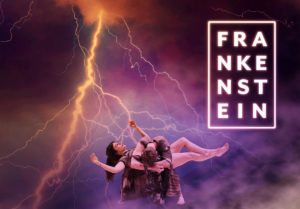
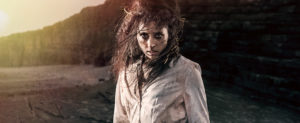
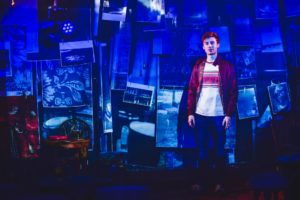
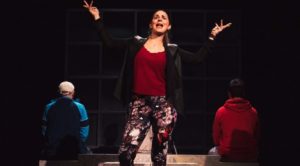
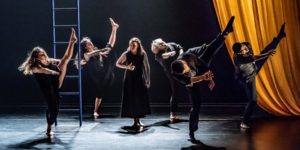

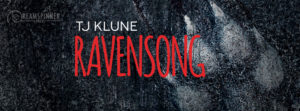
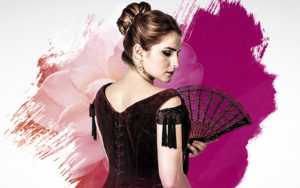
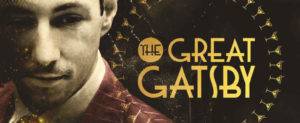
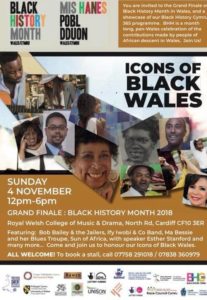
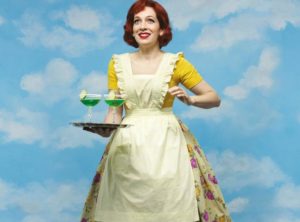
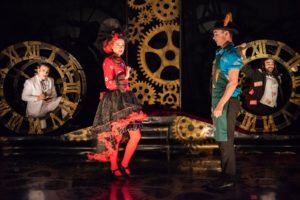
 (4.5 / 5)
(4.5 / 5)
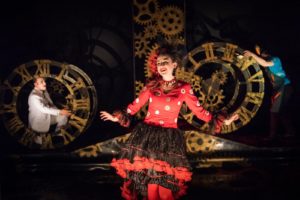
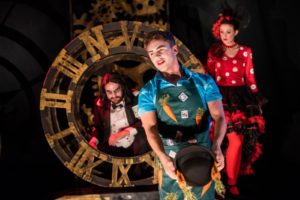
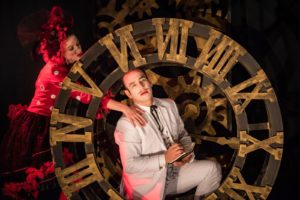
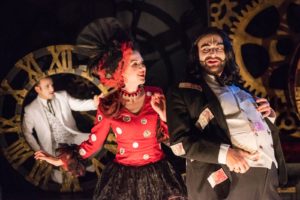
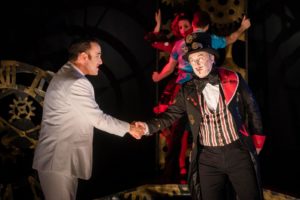
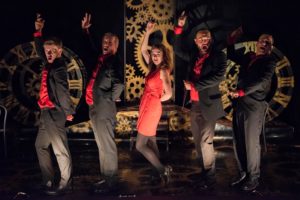
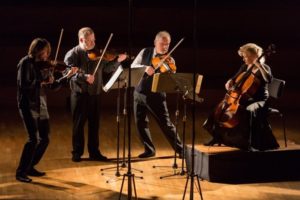
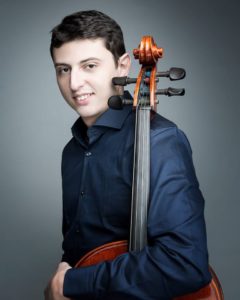
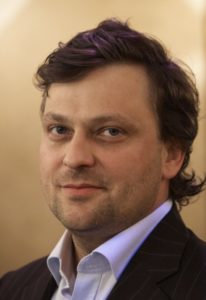

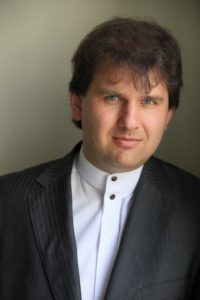
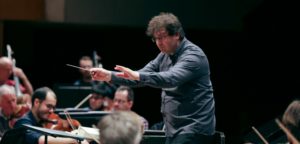
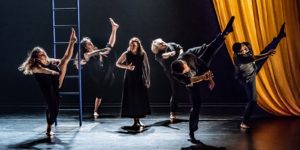
 (4 / 5)
(4 / 5)
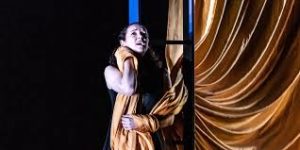
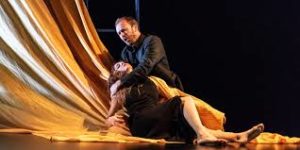
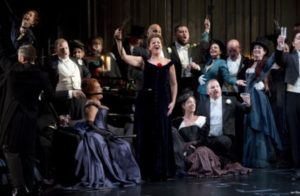
 (3.5 / 5)
(3.5 / 5)
